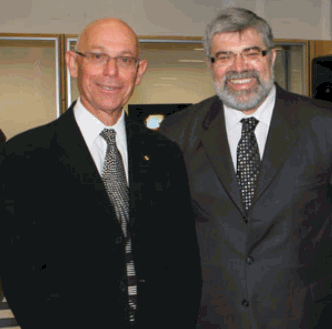|
|
|
|
|
|
|
News & Views item - May 2010 |
![]() A Distinct Element of Confrontation Has Surfaced in Governmental/University
Relations. (May 5, 2010)
A Distinct Element of Confrontation Has Surfaced in Governmental/University
Relations. (May 5, 2010)
The following quotations are taken from articles written by Luke Slattery, Bernard Lane and Guy Healey for The Australian's Higher Education Supplement.
Vice-Chancellor of The University of New South Wales Fred Hilmer:
 Fred Hilmer and Kim Carr in happier times |
We have 39 universities and I thought we had adopted a national strategy of
differentiation.
This is the spirit of the Bradley review of higher education, but when the
compact teams from Canberra came and sat down with us, and there were two teams
- a Carr and a Gillard team - nobody said, `Well, you guys are fantastic at
working with industry; I think you should put more emphasis on your research
agenda. You mightn't make it on some of the social policy issues, but do this
and we won't penalise you.'
Instead, the Gillard team says this is what you are going to have to do and
the Carr team says this is what you are going to do. And we are still required,
as a matter of financial survival, to do the international [student] stuff and,
meanwhile, back at the ranch, the academics are upset because they can't fulfil
their traditional roles.
Despite the government talking about more diversity in the sector and more autonomy for universities, we are now actually dealing with more regulation, and greater reporting requirements.
An anonymous "senior higher education executive":
The government's rhetoric before the last election is that they would get the bureaucratic boot off the throat of universities. But they're putting the sprigs in. We're being asked to fulfil multiple mission expectations and they're all colliding.
Universities Australia Chief Executive Glenn Withers unveiling a KPMG Econtech report which found the federal government would raise living standards by 5.5 per cent and add 6.1 per cent to gross domestic product by 2040 by bringing public funding for higher education into line with average spending in the world's leading economies [our emphasis]:
The rate of return in higher education is one of the highest around. For all the fuss and bother, the long-run benefit of the [Henry] tax reforms just announced by government is only 0.7 per cent of GDP.
The structure of the world economy is moving, over time, to higher knowledge-intensity employment. Higher education boosts the productivity of those who are graduates and that's the big finding of this report.
Then referring to the response of parliamentarians: I think they intellectually understand it, but it's not yet in the core of their being. While "top government bureaucrats" were dismissed with: They're still mired a little too much in the industrial revolution, not yet enough in the knowledge revolution.
In response the Minister for Innovation, Industry, Science and Research, Senator Kim Carr:
We are in the business of transforming universities, we are not in the business of handing out blank cheques. We want to ensure that universities aspire to excellence in both their teaching and in their research. We make no apologies for that.
And denying a lack of departmental coordination: There has never been a time that I can recall when universities were entirely the province of one minister. Julia [Gillard] and I have very strong and close working relationships, we see this as a seamless set of reforms. But the fact that we've got the attention on innovation and research actually enhances the capacity of universities to respond. We've had the biggest increase in university funding on record but the new funding will be conditional, it will be used to drive reform. For the first time in a very, very long time we're saying to the universities, it's time for you to set priorities.
Ms Gillard apparently confusing "refutation" with "rejection" had this to say:
Our integrated response to the Bradley review, backed by a massive injection of funds, will help turn our universities into centres of excellence that are accessible to all students. We refute claims that our reforms will not achieve this. Our new student-centred system will give institutions more autonomy but will be underpinned by the Tertiary Education Quality Standards Agency to ensure quality. TEQSA's approach to regulation is based on risk, leaving high-quality providers to flourish without unnecessary regulation.
In case you were worried that parliamentary doubletalk was dead, rest easy, it remains alive and is flourishing.